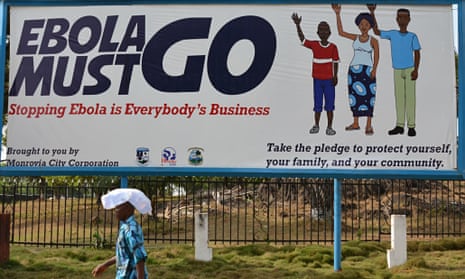Today in Brussels African political leaders and experts will meet to discuss how west Africa should be supported to respond to the Ebola catastrophe that has killed nearly 10,000 people.
There has been a significant improvement in the situation, with fewer than 150 cases a week instead of the thousands at the height of the latest outbreak. But we are concerned by the dangerous mismatch between perceptions and the reality of the situation. Unless this is addressed, we risk a repetition.
First of all, the perception is that the Ebola epidemic is under control. However, even if there has been a spectacular decline in new infections and deaths, there are still more than 10 new cases reported a day in Guinea and Sierra Leone combined, with many appearing from previously unknown transmission chains.
Another perception is that while the international community was slow to respond to Ebola, it has finally got its act together and will beat the disease. The reality is that many of the billions pledged by governments around the world have not yet been spent, and that local communities were at least as instrumental in beating the disease, often before the planned treatment facilities were built.
There is a perception that doctors and nurses were the key to beating the disease. They certainly played an essential role – and were tragically killed in large numbers. The reality is that community leaders and community organisers were equally pivotal players in turning the trajectory of the disease.
The perception is that west African communities were resistant to changing their traditional burial and other practices, when the truth is that they changed their practices when they were engaged by people they trusted. Continuing violence against aid workers in parts of Guinea shows that this task is not complete.
These misconceptions could have been avoided if we had heeded the lessons of previous Ebola epidemics in central Africa. Those outbreaks were stopped by an early response, along with an intense collaboration between public health workers and affected communities. The current Ebola epidemic may be larger and more urban, and have global repercussions. But for all those differences, the basic lessons of previous epidemics still applied. The epidemic grew in part because of the lack of trust that rural and urban communities had in the institutions meant to protect them. The epidemic was stopped in places such as Kenema district in Sierra Leone, and Lofa county in Liberia, when local people were treated as trusted and active partners, not passive victims or even potential enemies.
It’s now time to apply these lessons to the challenges of 2015 and beyond. That means turning upside down the way the response to epidemics such as Ebola are conceived. Instead of trying to develop solutions from outside, and then getting communities on board, we need to proceed in reverse order. That is because public trust and confidence are key to effective intervention, which need not be a vague and hopeless ambition.
There are practical steps to eradicating the disease and preventing a future outbreak. First, trusted community leaders need to be front and centre in all phases of public health action. Without them the public health professionals will not get an adequate hearing.
Second, in all the planning for new health facilities and equipment, governments and donors must not forget that health is above all a people business. They need to make sure that health workers are paid a living wage, every month, on time, and that they are properly trained and well-resourced. The strikes last year by health workers over pay in Liberia and Sierra Leone became a catalyst for public disaffection, corroding trust and collaboration when it was most needed. Equally, low pay is an invitation to corruption, a false saving.
Third, the first test of community leadership and health systems, and the partnership between them, is infection prevention and control, which needs to take place in health facilities but also way beyond them, to include schools and workplaces. During the epidemic people rapidly identified which facilities were doing infection prevention in the most thorough way. And of course where there was no confidence in such measures, people in need of treatment for a range of diseases and conditions decided to do without.
It is always tempting to focus on technical solutions. But stopping epidemics is in the first instance about people and their behaviour. That requires a culture change, not just in west Africa but among the rest of us too.
